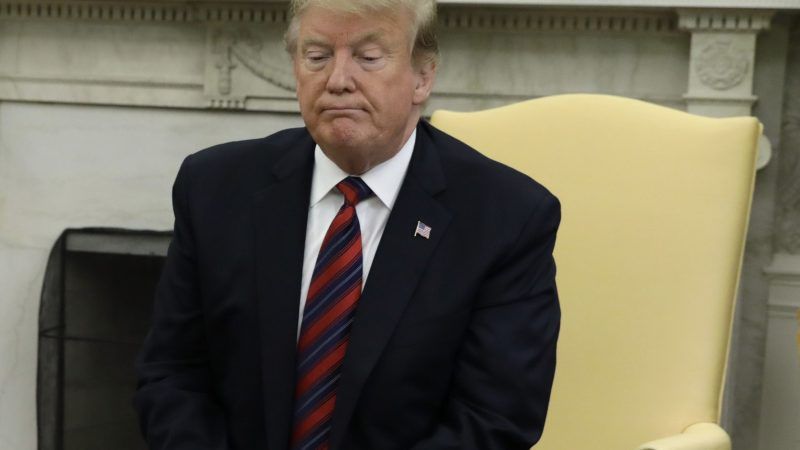Market Crashes as Trump Threatens More Tariffs After China Trade Deal Flops
Is the president the only person left in America who doesn't understand that Americans are paying for his tariffs?

With the prospects of a trade deal with China apparently dimming, President Donald Trump lashed out Sunday in the only two ways he seems to know.
He vented on Twitter. And while he was venting, he tweeted a threat to hit Americans with more tariffs.
That's not exactly what the president said, of course. He's still trying to maintain the illusion that China is somehow paying for the tariffs that his administration has imposed. But he threatened to hike the tariffs on some imported Chinese goods from 10 percent to 25 percent, and he simultaneously threatened to hit the remaining untaxed Chinese imports with a new round of 25 percent tariffs.
The impetus for Trump's Twitter tantrum seems to have been a Sunday meeting with some of his top trade aides, who reportedly delivered a disappointing message. Citing unnamed sources, Reuters says that "significant hurdles" remain in reaching a trade deal with China. Late last year, Trump had threatened to hike tariffs on Chinese imports if a trade deal was not struck by March 1. The president backed away from that threat as the deadline approached and passed. At the time, he seemed pleased with the progress being made, but that seems to no longer be the case.
Trump's tweets may have added to the hurdles. A top Chinese official has cancelled plans to visit Washington next weekend to discuss trade issues, and it remains unclear whether the rest of a planned Chinese trade delegation will make the trip. Meanwhile, the stock market dropped sharply Monday morning as news of a possible escalation of a trade war between the world's two biggest economies seemed to spook investors (again), following a big drop in futures trading on Sunday after Trump's tweet.
It's unclear whether Trump's threats will become reality. It's possible that he's bluffing—though if he is, China doesn't seem to be buying it—or that he's trying to send a political signal to his domestic base. After all, trade negotiations are as much a matter of domestic policy as they are foreign policy.
But if he does follow through on Sunday's threat, that would be the height of folly. The president may love to claim that China is paying for his tariffs, but surely he has realized by now that that's not true. More and higher tariffs will hit the same American consumers and businesses that have already borne the brunt of Trump's ill-conceived trade war.
The tariffs imposed by Trump in 2018 cost the U.S. economy $6.9 billion last year—above and beyond the $12.3 billion paid by American consumers and importers to the federal government.
"We find that the U.S. tariffs were almost completely passed through into U.S. domestic prices, so that the entire incidence of the tariffs fell on domestic consumers and importers," write economists from the Federal Reserve Bank of New York, Princeton University, and Columbia University in a March paper published by the Centre for Economic Policy Research. By the end of last year, Trump's tariffs were costing American consumers and businesses about $1.4 billion each month, they found.
Trump continues to claim that China is paying for the tariffs, but his administration has not published any data to support that claim. Indeed, the president's own Council of Economic Advisors admitted in its year-end report that the estimated $14.4 billion in tariff revenue sent to the U.S. Treasury during 2018 was due to "costs paid by consumers in the form of higher prices."
Hiking tariffs will only make things worse. A February study published by the Trade Partnership estimated that slapping 25 percent tariffs on all remaining non-tariff Chinese imports—which is exactly what Trump threatened to do on Sunday—would cost more than 2.1 million American jobs, reduce the size of the U.S. economy by more than 1 percent, and cost the average family of four about $2,200.
Even as a negotiating tactic, that would be madness.
As difficult as the trade war has been already, worse could lie ahead. Daniel Drezner, a professor of international politics at Tufts University, warned in a recent Reason story that Trump's protectionist policies could lead to World War III—or, at least, to a bifurcated world trade system in which the U.S. and China carve out separate and competing spheres of influence similar to how the U.S. and Soviet Union once did.
Even if things don't get that bad, it's difficult to understand Trump's strategy in the short term. Blowing up planned trade negotiations, tanking the stock market, undermining the U.S. economy, and foisting more and higher taxes on American consumers and businesses is…well, it's an odd thing for a president facing re-election to do.
If you really want to understand just how absurd Trump's latest trade tactic is, just take a look at who's cheering for him:
Hang tough on China, President @realDonaldTrump. Don't back down.
Strength is the only way to win with China. https://t.co/pZqeR346ov
— Chuck Schumer (@SenSchumer) May 5, 2019

Show Comments (132)